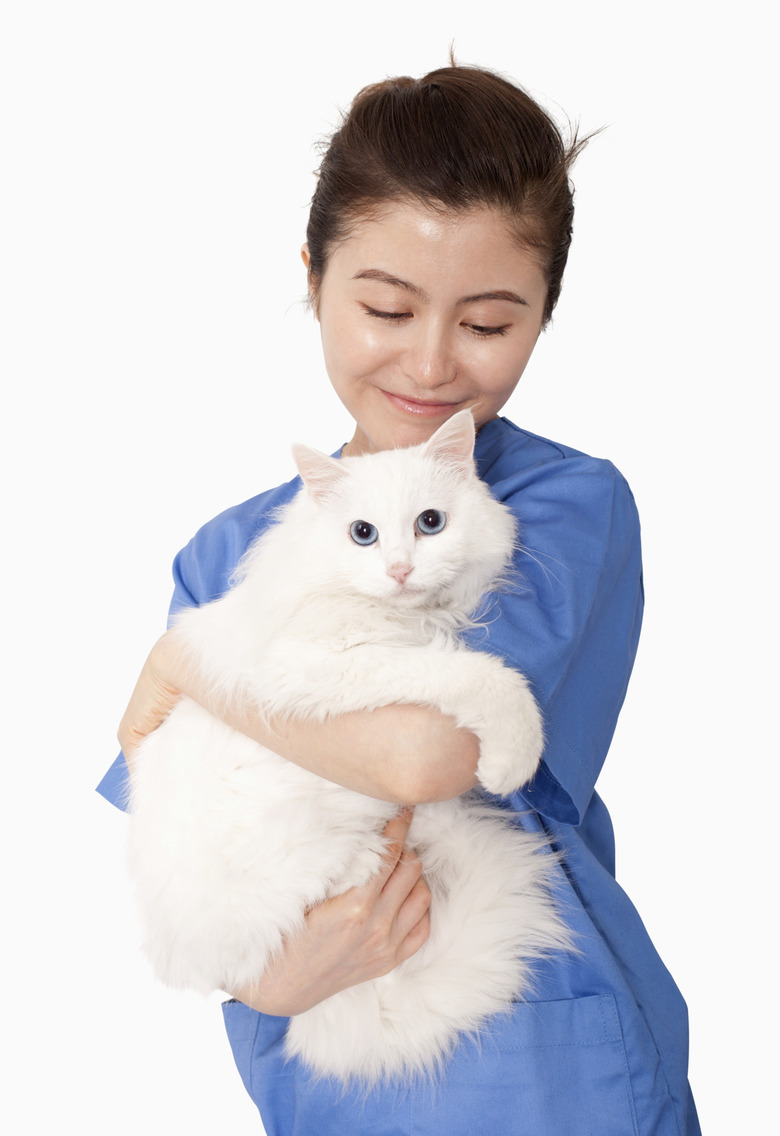The Best Food For Crystals In Cat Urine
Crystalluria is the formation of mineral crystals in the urinary tract. While these crystals may be expelled harmlessly, crystalluria in felines usually is diagnosed after a blockage or cystitis. A blockage is a potentially fatal veterinary emergency, caused when crystals aggregate and form a plug. Cystitis happens when crystals irritate the bladder's lining and cause bloody urine and difficulty urinating. Crystalluria may be temporary or chronic, and may indicate an underlying medical condition. Treatments include surgery, rehydration therapy and dietary changes. The best diet for treating crystalluria is the one your veterinarian recommends for your individual kitty, based on the type of crystals he has developed.
Types of Crystals
Types of Crystals
There are many types of feline urinary tract crystals, but the two most common are struvite and calcium oxalate.
Struvite crystals are made of magnesium ammonium phosphate, and also are called triple phosphate crystals. High ash (inert mineral) content in dry foods was once considered their primary cause, but now is considered secondary to urine pH, length of urine retention and overall dietary magnesium and phosphorus levels. Many factors affect urine pH, including health, hydration, diet and environmental stress. Personal habits, temperament and health affect length of urine retention. Foods and water sources can both contribute to dietary magnesium and phosphorous levels. Struvite crystals may be treatable solely through prescription diet and improved hydration, though they can require surgical intervention.
Calcium oxalate crystals are made of calcium. Causes of calcium crystal formation include genetic predisposition and urine pH. Their structure is more stable than struvite crystals, and almost always require surgical removal. They are associated with bladder stones.
Prescription Diets
Prescription Diets
Prescription diets are foods formulated to treat specific conditions. It is important that you heed your veterinarian's advice regarding prescription diet, because each diet treats a specific kind of crystal and can make other types worse.
Struvite-crystal prescription diets lower urine pH, making it more acidic. They have high levels of salt and low levels of magnesium and other minerals. They may help dissolve existing crystals, as well as prevent new ones from forming.
Calcium-crystal prescription diets raise urine pH, making it more basic, or alkaline. They may help prevent new crystals from forming, but will not dissolve ones that already exist.
Your vet may recommend a prescription canned diet, dry diet or both. In addition, she may recommend adding a powdered glycosaminoglycan supplement to your cat's food to help rebuild and protect his bladder's lining.
Sources of Hydration
Sources of Hydration
Appropriate hydration increases urine dilution and volume and decreases the length of urine retention. This helps your cat pass old crystals, heal his urinary tract lining and prevent new crystals.
Your first line of hydration defense is to increase the amount of water your cat drinks. Your kitty needs clean, fresh water at all times. If he is reluctant to drink or to drink enough from a water dish, try a cat water fountain. These fountains aerate and recirculate water, mimicking natural, flowing sources and may encourage drinking.
Your vet may recommend increasing or entirely replacing dry food with canned to increase your cat's fluid consumption. You may be able to add additional fluid by mixing canned food with other liquid, such as water, meat broth or feline milk replacer.
Lifelong Maintenance
Lifelong Maintenance
Once your cat has experienced a crystalluria-related problem, his treatment is probably a lifelong endeavor. His switch to a prescription diet may be permanent. These diets are optimized to prevent future problems, so it is important that you do not make changes without veterinary guidance. Monitor your pet's litter box habits, quality and frequency of urination on a daily basis so you can catch cystitis outbreaks or obstructions as early as possible. Do not attempt to treat suspected crystals on your own. Urinalysis is necessary to determine crystal type and to guide treatment.
Always check with your veterinarian before changing your pet's diet, medication, or physical activity routines. This information is not a substitute for a vet's opinion.
